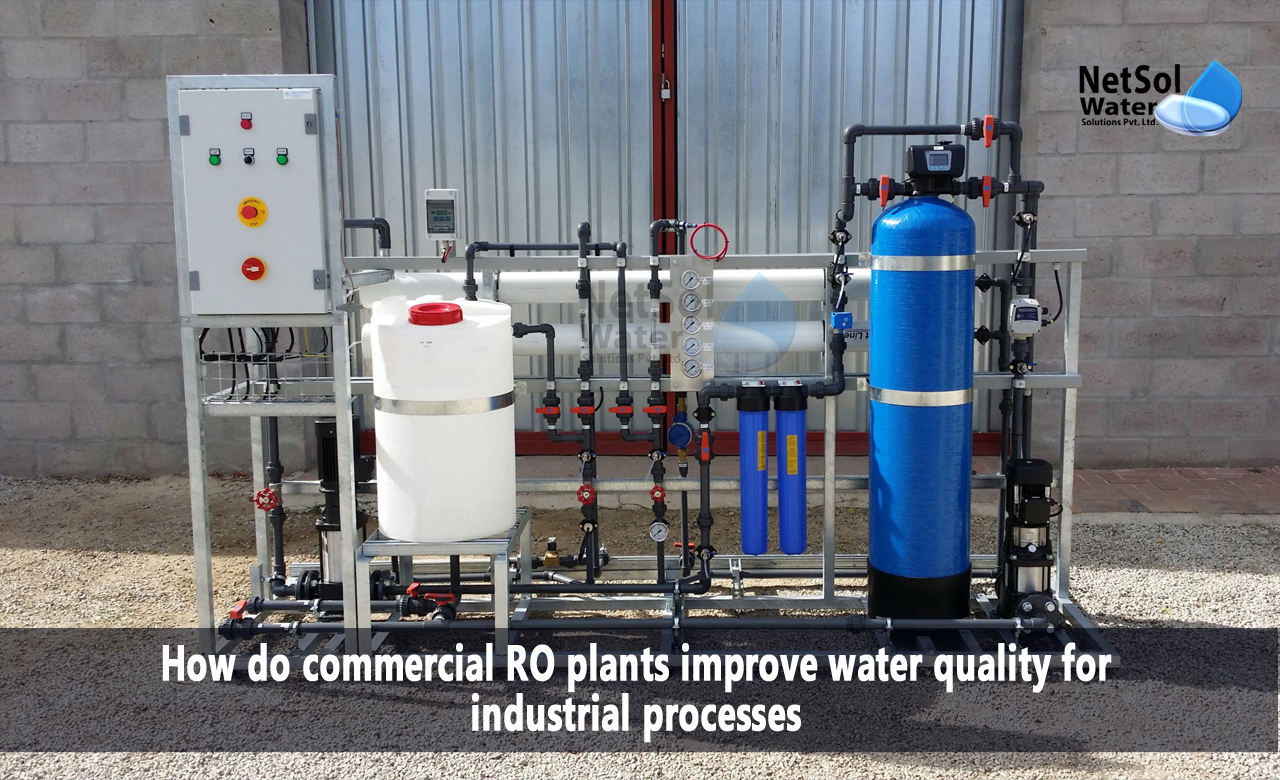How do commercial RO plants improve water quality?
Water quality is a critical factor in industrial processes, as impurities and contaminants can negatively impact productivity, product quality, and equipment lifespan. Commercial reverse osmosis (RO) plants have emerged as an effective solution for enhancing water quality in industrial settings.
We will explore the role of commercial RO plants in improving water quality for industrial processes, highlighting their benefits, operation, and considerations.
Understanding Reverse Osmosis Technology
Some points to for easily understanding of RO technology are as follows:
1. Principles of Reverse Osmosis:
Reverse osmosis is a water treatment process that utilizes a semipermeable membrane to remove dissolved salts, contaminants, and impurities from water. By applying pressure, water is forced through the membrane, leaving behind the impurities and producing high-quality freshwater.
2. Operation of Commercial RO Plants:
Commercial RO plants consist of various components, including pre-treatment units, high-pressure pumps, RO membranes, and post-treatment units. The water undergoes pre-treatment to remove suspended particles, followed by the RO process, where the water is forced through the semipermeable membrane. Post-treatment may include disinfection, pH adjustment, and remineralization, depending on the specific requirements of the industrial process.
Benefits of Commercial RO Plants in Industrial Processes
Some of the benefits of commercial RO Plants in Industrial Processes are as follows:
1. Removal of Dissolved Solids:
Commercial RO plants effectively remove dissolved solids, such as salts, minerals, and contaminants, from the water. This ensures that the water used in industrial processes is free from impurities that can negatively affect product quality, equipment performance, and overall operational efficiency.
2. Protection of Equipment:
By purifying the water, commercial RO plants protect industrial equipment from scale and corrosion. Scaling occurs when dissolved minerals precipitate and form deposits on equipment surfaces, reducing efficiency and leading to costly repairs. RO-treated water prevents scaling, extending the lifespan of equipment and reducing maintenance costs.
3. Consistency and Reliability:
Commercial RO plants provide a consistent and reliable supply of high-quality water. This is particularly important for industrial processes that require precise water specifications and depend on water quality for optimal performance and product consistency.
Considerations and Implementation
Some considerations and implementations that should be taken into consideration are as follows:
1. System Design and Sizing:
Proper system design and sizing are crucial to ensure the efficient operation of commercial RO plants in industrial settings. Factors such as water demand, feedwater quality, and required treated water quality should be considered during the design phase. Sizing the plant appropriately ensures that the system can meet the specific water demands of the industrial process.
2. Pre-Treatment Requirements:
Effective pre-treatment is essential to protect the RO membranes from fouling and scaling. Pre-treatment units, such as sediment filters, activated carbon filters, and water softeners, remove suspended particles, organic matter, and hardness-causing minerals. Customized pre-treatment processes should be implemented based on the specific characteristics of the feedwater.
3. Monitoring and Maintenance:
Regular monitoring of system performance, including monitoring feedwater quality, pressure differentials, and permeate quality, is necessary to ensure the optimal operation of the commercial RO plant. Routine maintenance, such as membrane cleaning and replacement, is crucial for maintaining system efficiency and prolonging the lifespan of the membranes.
Summary:
Commercial RO plants play a crucial role in enhancing water quality for industrial processes. By utilizing reverse osmosis technology, these plants effectively remove dissolved solids and contaminants, protecting equipment, ensuring product quality, and improving overall operational efficiency.
Implementing proper system design, pre-treatment, monitoring, and maintenance practices are key considerations for successfully incorporating commercial RO plants into industrial operations. With the adoption of commercial RO technology, industries can optimize their water usage, minimize the risk of equipment damage, and achieve sustainable and high-quality production processes.
Leading manufacturer of sewage treatment plants in India.
Netsol Water is the leading manufacturer, supplier, and exporter of a quality selection of water treatment, and wastewater treatment products in India, by using advanced sewage treatment methods.
RO plants, water softeners, ETPs, STPs, DM plants, AMC, O&M, Ultra filtration, UV, Ozonation, ZLD plants, Anoxic tanks, and other goods and services are available from us. We also provide services to businesses in sectors including automotive, pharmaceutical, textile, pulp & paper, beverages, refineries, schools, hospitals, office buildings, and hotels, among others.
Netsol Water is Greater Noida-based leading water & wastewater treatment plant manufacturer. We are industry's most demanding company based on client review and work quality. We are known as best commercial RO plant manufacturers, industrial RO plant manufacturer, sewage treatment plant manufacturer, Water Softener Plant Manufacturers and effluent treatment plant manufacturers. Apart from this 24x7 customer support is our USP. Call on +91-9650608473, or write us at enquiry@netsolwater.com for any support, inquiry or product-purchase related query.



